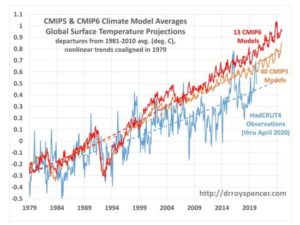The latest U.N. climate change assessment report, AR6, paints a gloomy picture of the future and has been presented in the media with doomsday bravado accompanied by images of a burning planet and a demand for permanent climate lockdown. However, behind the glossy papers hides the fact that few scientific improvements in our understanding of climate change have occurred in four decades. The report echoes the embarrassingly failed predictions of the 1980s when climate change first came in vogue.
More Certain?
 Headlines worldwide read that climate scientists are “more certain than ever” that we are headed for catastrophe. They cite piles of new evidence that fortify their position. Part of the problem lies in the definition of “evidence.” In the good old days of science, it meant observational data that validated the theories. However, little new data has emerged to strengthen theories of doom in the last four decades. The additional evidence amounts to computer model simulations and “expert judgment” or a “quantitative survey of expert views.” In plain language: opinion.
Headlines worldwide read that climate scientists are “more certain than ever” that we are headed for catastrophe. They cite piles of new evidence that fortify their position. Part of the problem lies in the definition of “evidence.” In the good old days of science, it meant observational data that validated the theories. However, little new data has emerged to strengthen theories of doom in the last four decades. The additional evidence amounts to computer model simulations and “expert judgment” or a “quantitative survey of expert views.” In plain language: opinion.
In 1979, Dr. Jule Charney assembled a report called “Climate Change and Carbon Dioxide: A Scientific Assessment” for the National Research Council. Charney estimated that a doubling of CO2 would lead to global warming of between 1.5°C and 4.5°C (2.7°F – 8.1°F). He arrived at this conclusion using a simple pocket calculator to explain the significant temperature variations during the ice ages. The uncertainty is huge, a factor of three. Imagine going into a plane, and the captain announces that the trip will take between 1.5 and 4.5 hours. Would you feel safe?
In 1990, these numbers were echoed in I.P.C.C.’s First Assessment Report. By 2014, AR5 stated that “Equilibrium climate sensitivity is likely in the range 1.5°C to 4.5°C (high confidence), extremely unlikely less than 1°C (high confidence), and very unlikely greater than 6°C (medium confidence).” Thus, in 35 years, nothing fundamentally new had been learned about climate to reduce the uncertainty. If anything, acknowledged uncertainty had increased.
 In AR6, the “likely” range has been narrowed to 2.5°C to 4°C, although the reduced uncertainty is primarily based on more advanced climate models that still dramatically overestimate observed warming. The empirical science alone does not justify a strongly worded conclusion about future climate change.
In AR6, the “likely” range has been narrowed to 2.5°C to 4°C, although the reduced uncertainty is primarily based on more advanced climate models that still dramatically overestimate observed warming. The empirical science alone does not justify a strongly worded conclusion about future climate change.
Back in Time
Headlines that promise doom unless we hand over liberties to experts sound eerily similar to the news more than 30 years ago. In 1989, AP published an article claiming “a senior U.N. environmental official says entire nations could be wiped off the face of the Earth by rising sea levels if the global warming trend is not reversed by the year 2000.” He added that “governments have a 10-year window of opportunity to solve the greenhouse effect before it goes beyond human control.”
How much would the world warm? “The most conservative scientific estimate that the Earth’s temperature will rise 1 to 7 degrees in the next 30 years.” That was 32 years ago, and today we know that the official global land temperature data used by the I.P.C.C. (HadCRUT4) shows a mere 0.6°C warming.
Instead of acknowledging its extravagant failure, the U.N. doubles down on its doomsday predictions. Some call repeating the same mistake and expecting a different result the definition of insanity. Others call it hubris.
~
Read more from Caroline Adana.




